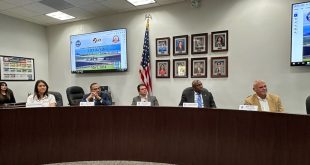President Joe Biden has included a crucial $310 million allocation in his emergency supplemental funding request to rehabilitate and expand the South Bay International Wastewater Treatment Plant. This initiative addresses the pressing issue of cross-border wastewater pollution in the Tijuana River Valley, a matter of great concern. Last month, Rep. Scott Peters spearheaded a request to congressional leaders, seeking this much-needed funding. The President’s decision signifies a robust endorsement of Rep. Peters’ tireless efforts, increasing the likelihood that these funds will be incorporated into the final funding package ratified by Congress.
“For years, San Diegans have been urging the federal government to resolve this crisis. Today, in response to their relentless advocacy and the dedicated work of officials at every echelon of governance, the President has heeded our calls for assistance,” stated Rep. Peters.
He continued, emphasizing, “Let there be no doubt, this is not a ‘mission accomplished’ moment. Securing approval for this funding is an uphill battle that requires the endorsement of both chambers of Congress. I am already hard at work, ensuring we garner the necessary votes to push this vital funding across the finish line. I am also aware that our Senators are diligently persuading their colleagues, and I implore them not to relent in their advocacy.”
Furthermore, Rep. Peters led a bipartisan letter to the Department of State, demanding a comprehensive account of how the South Bay International Wastewater Treatment Plant (SBIWTP) deteriorated to such a dire state. Last month, Rep. Peters proposed an amendment to the Fiscal Year 2024 Interior, Environment, and Related Programs Appropriations Bill, aimed at augmenting funding for the U.S.-Mexico Border Water Infrastructure Grant Program (BWIP). Additionally, he suggested two amendments to the Fiscal Year 2024 State, Foreign Operations, and Related Programs Appropriations Bill (SFOPS) to bolster annual construction funding for the US International Boundary and Water Commission (USIBWC) to $100 million.
In August, Rep. Peters orchestrated two letters addressed to the Office of Management and Budget, the State Department, and the Environmental Protection Agency (EPA), urging them to allocate urgent additional funding to combat this crisis. Furthermore, in July, members of the San Diego congressional delegation urged Secretary of State Antony Blinken to visit the dilapidated plant and direct environmental justice funds from the Infrastructure Investment and Jobs Act (IIJA) and the Inflation Reduction Act (IRA) to mitigate pollutant discharge. In July, they also penned a letter to President Biden and submitted an amendment to the National Defense Authorization Act (NDAA) for Fiscal Year 2024, urging the administration to declare this crisis a federal emergency. Back in June, Rep. Peters and fellow members of the San Diego Congressional delegation wrote to the Governor of Baja California, emphasizing the need for accountability regarding the Mexican government’s commitments to construct wastewater treatment infrastructure.
California Governor Gavin Newsom released a statement applauding President Biden’s inclusion of $310 million in emergency supplemental funding to address the Tijuana River sewage crisis:
“My administration has been in close collaboration with President Biden and his team on this matter, and I extend my gratitude for the incorporation of the requested $310 million in the emergency supplemental bill. This funding will expedite the much-needed construction.”
He further expressed appreciation for the collective efforts of elected leaders, including the late Senator Feinstein, Senator Padilla, Representative Peters, the San Diego Congressional delegation, Speaker Emerita Pelosi, Senate President pro-Tempore Atkins, and local and state leaders who have tirelessly worked on this issue for years and played a significant role in making today’s announcement a reality. Governor Newsom underscored the urgency for Congress to swiftly ratify the President’s proposal to address this crisis.
The Tijuana River Valley, encompassing an array of wetland and riparian areas, is a wide natural floodplain. This valley represents a fraction of the Tijuana River’s expansive 1,700 square miles watershed. The watershed region includes segments of southern San Diego County and northern Baja California, Mexico. The Tijuana River Valley Planning Area is demarcated by Imperial Beach and the Otay Mesa-Nestor community to the north, San Ysidro to the east, Mexico to the south, and Border Field State Park and Imperial Beach to the west.






